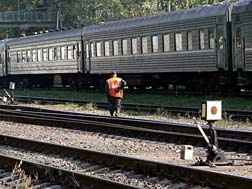[lawsuits] are being filed.
The House Transportation and Infrastructure Committee recently concluded its first hearing into the ongoing use of harassment and intimidation to deter rail workers from reporting on-the-job accidents.
Greg Haskins, a former Union Pacific employee, has experienced this firsthand. "I was struck in the head by a piece of steel on a rail car brought into Kansas City. When I came to, I was lying face down in my own blood. No call to 911 was ever made. No one volunteered to rush me to an emergency room," he told the congressional committee.
"There is a demonstrated record that railroads have attempted to limit medical care for injured employees or influence doctors," says Frank Wilner, director of public relations with United Transportation Union in Virginia.
 In one reported case, he notes, a Norfolk Southern supervisor posed as a clergyman to get inside the hospital room of an injured worker. Once there, he tried to convince the attending physician not to prescribe a particular medication.
In one reported case, he notes, a Norfolk Southern supervisor posed as a clergyman to get inside the hospital room of an injured worker. Once there, he tried to convince the attending physician not to prescribe a particular medication."Supervisors receive bonuses for decreasing reportable workplace injuries," explains Wilner. Prescribing certain medications, he adds, automatically makes the injury reportable to the Federal Railroad Administration (FRA).
Former Norfolk Southern employee Timothy Knisely certainly felt the pressure not to report his accident, which happened when he tried to disconnect an air hose from a set of rail cars. The hose broke loose, continually striking him in the head, chest, arms and legs with 80 pounds of pressure.
"The trainmaster tried to persuade me to not report the injury," Knisely told Congress. "But I resisted his pressure and reported it. The next day I was charged with making a false report. After 27 years of dedicated and loyal service to the railroad, I was subsequently charged with lying about being struck in the head and eventually fired."
It doesn't have to be this way. Unlike most workers in this country who are covered by workers' compensation laws - which prohibit them from suing their employer if they are injured - railroad workers in the U.S. are protected under FELA, the Federal Employers' Liability Act. This unique legislation, enacted in1908, recognizes the dangerous and often deadly job railroad workers perform.
The legislation safeguards railroad workers and gives them a legal avenue to compensate for their injuries that is not available to most other workers in America, notes Wilner.
Now there is added protection. Congress has passed the Federal Railroad Safety Improvement Act of 2007, which guarantees the right to prompt medical attention and makes it unlawful for a railroad to interfere in the relationship between an injured railroad worker and their doctor.
If injured, Wilner recommends that railway workers immediately not say anything about the accident and demand medical care, repeatedly if necessary.
Then at the earliest opportunity, he says, they should be put in touch with legal counsel that has proven experience in the area.
READ MORE LEGAL NEWS
That reality can be lethal, says Wilner. Although sectors like the retail industry appear to have a higher number of injuries overall, these are primarily strains and sprains.
"These are not life-threatening," says Wilner. "On the railroad, which is a very unforgiving industry, injuries often end a career."
Just ask Greg Haskins and Timothy Knisely.
By donalee Moulto

READER COMMENTS
Lori atwood
on
Thank you Lori atwood